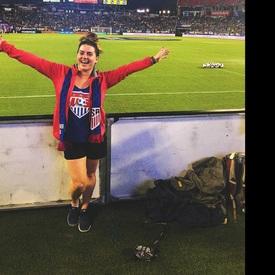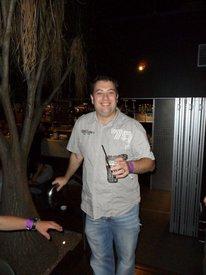I think my HRM is trippin' bawwls

futurefitgirl88
Posts: 284 Member
Alright here is the deal...I run for 30 mins and I burn only 300 calories (I run outdoors and was literally pushing myself sooooo hard....)...and I do turbo jam cardio party which I do NOT find challenging AT ALL and I burn like 450 in the same time (30mins)?!
Haha funniest thing is...with P90X cardio X I burn 440 calories (less than TurboJam) while it was significantly harder (goddamn yoga) than it!!!!!
What's the deal?? Should I get my polar watch into rehab??
Haha funniest thing is...with P90X cardio X I burn 440 calories (less than TurboJam) while it was significantly harder (goddamn yoga) than it!!!!!
What's the deal?? Should I get my polar watch into rehab??
0
Replies
-
I have a polar F40 and under the same position as OP^
I don't want to run and get another one (expensive), but I want to know where I am on my heart zones and calories burned. My polar says "transmitter error at times" and the heart rate is all over the place....0 -
the higher your heart rate is the lower your calorie burn is. a lower heart rate is for calorie/fat burn and a higher heart rate is for cardio workout.0
-
I don't know about the other workouts but 300 calories in 30 minutes is about right. Even if you are pushing yourself.0
-
I think you HRM is on LSD!!! wooo :noway:0
-
the higher your heart rate is the lower your calorie burn is. a lower heart rate is for calorie/fat burn and a higher heart rate is for cardio workout.
I don't mean to hijack this thread but this is just not true at all. That is a common exercise myth. Just google Fat burning zone and you will get pages of studies showing it is a myth.
The harder you work the more calories you burn, plain and simple.0 -
the higher your heart rate is the lower your calorie burn is. a lower heart rate is for calorie/fat burn and a higher heart rate is for cardio workout.
I don't mean to hijack this thread but this is just not true at all. That is a common exercise myth. Just google Fat burning zone and you will get pages of studies showing it is a myth.
The harder you work the more calories you burn, plain and simple.
you can also google it and find many articles that support itl. it because there is more than one opinion out there.0 -
The running sounds about right. I burn about 300-330 calories running at a 3% incline at a speed of 5.3-5.5 for 30 minutes with a 1 minute warm up and about 2-3 minutes walking at 3.9 on the treadmill. I'm about the same weight. I don't do videos I hate them so I'm not sure what the deal is there maybe your heart rate was elevated due to caffeine or heat or maybe it is a more intense workout.0
-
haha yeah 300 for running is fine but 480 burnt for Turbo Jam (which is honestly, quite 'soft') was kind of weird!! I do not want to be over estimating my exercise calories...so I was wondering.....if there could be a problem with it!!!0
-
I don't know about the other workouts but 300 calories in 30 minutes is about right. Even if you are pushing yourself.
this^^
i only burn more than that if i'm seeeriously hustling...like busting *kitten*.. 100 calories every 10 minutes is about right for a good hard workout.0 -
the higher your heart rate is the lower your calorie burn is. a lower heart rate is for calorie/fat burn and a higher heart rate is for cardio workout.
I don't mean to hijack this thread but this is just not true at all. That is a common exercise myth. Just google Fat burning zone and you will get pages of studies showing it is a myth.
The harder you work the more calories you burn, plain and simple.
you can also google it and find many articles that support itl. it because there is more than one opinion out there.
Really??? Please post a link. Never seen anything this decade saying that it's true.
Fat burning zone heart rate utilizes calories from body fat better than higher heart rates, but you say that is burns less calories to have a higher heart rate. And thats just not true!!! Please don't write things on here that misinform people.0 -
I don't know about the other workouts but 300 calories in 30 minutes is about right. Even if you are pushing yourself.
this^^
i only burn more than that if i'm seeeriously hustling...like busting *kitten*.. 100 calories every 10 minutes is about right for a good hard workout.
Trust me I was busting my *kitten*!! But its not the 300 calorie that is alarming...its just that I burnt more calories for a much easier workout ....0 -
I agree with idwoof 100%. The more you work the more you burn. It's common sense.0
-
the higher your heart rate is the lower your calorie burn is. a lower heart rate is for calorie/fat burn and a higher heart rate is for cardio workout.
I don't mean to hijack this thread but this is just not true at all. That is a common exercise myth. Just google Fat burning zone and you will get pages of studies showing it is a myth.
The harder you work the more calories you burn, plain and simple.
you can also google it and find many articles that support itl. it because there is more than one opinion out there.
Really??? Please post a link. Never seen anything this decade saying that it's true.
Fat burning zone heart rate utilizes calories from body fat better than higher heart rates, but you say that is burns less calories to have a higher heart rate. And thats just not true!!! Please don't write things on here that misinform people.
Pitching in to agree here. Besides, post-exercise fat oxidation is much higher and more sustained after high intensity exercise. We've learned so much about V02max and fat oxidation in the past 10-15 years...the "fat burning zone" does increase fat burn short term, yes, but not over the long haul. And higher heartrate = higher calorie burn.0 -
Yes, everybody, please listen to idwoof!!!! He is right on the money!!!!:flowerforyou:0
-
Alright here is the deal...I run for 30 mins and I burn only 300 calories (I run outdoors and was literally pushing myself sooooo hard....)...and I do turbo jam cardio party which I do NOT find challenging AT ALL and I burn like 450 in the same time (30mins)?!
As other have stated 300 cal / 30 minutes run sound quite normal.....that's what I have too, when running at a steady pace.
I don't know how the other exercises are - but if they are build around interval spikes meaning that you go for high intensity (very high pulse - near max pulse)for a few minutes and then for lower intensity for a minute (not allowing you pulse to dip very low) and then switch to high intensity again you may see higher numbers.
At least that's what I see when I do interval training vs. steady state training on the bike.
This will in most cases translate to a higher average pulse during the workout than you could sustain on a steady state exercise and thus to more calories burned.
Does your HRM have the option to show you the average heart rate for the different training passes?0 -
haha it does actually....! But I was just wondering...why I am burning more calories doing exercises I do not find challenging and lesser calories doing exercises where I'm literally killing myself!! Was wondering if anyone had a clue to that??0
-
It could be that exercises like dancing and workout dvds are full body workouts and are engaging more muscles. The reason you think you are working harder running might be because of the cardio part of running, it seems harder but you might be burning less calories. Just like vigorous weight lifting, may not make you breathe as hard, but can still burn comparable calories to jogging or running. Hope that helps0
-
That is true. Silly me. And for some ready running out doors is twice harder (i'm in the tropics, freain 35 degrees out) than on a treadmill...although the calorie burn is pretty much equal!!0
-
a harder workout doesnt necisarily mean higher heart rate tho.
i find myself working my *kitten* off on the excercise bike but i cant get my rate over 155. on the tready i can hit 180
my HRM records max and ave heart rate too, so i always record that as well as my calorie burn
(i can burn 500 in 30 mins on a treadmill, but thats because im 90kg)0 -
Makes sense..yeah... but this always makes me wanna question...whether the correlation between heart rate and calories burnt is really all that accurate..0
-
@Jesse13 "My polar says "transmitter error at times" and the heart rate is all over the place.."
If you interested I posted this up a few days back on what I found with mine - if the F40 is the wearlink strap, it might help you.
http://www.myfitnesspal.com/topics/show/322302-is-your-polar-wearlink-strap-giving-you-grief?hl=wearlink+grief#posts-42972290 -
Makes sense..yeah... but this always makes me wanna question...whether the correlation between heart rate and calories burnt is really all that accurate..
Healthy skepticism - I like it
Of course the heart rate vs. calories burned correlation is just an estimate. It is a good estimate typically based on formulas derived from sound scientific models based on significant statistical data......but still just an estimate.
It is however the best portable estimation you can get as an absolute measurement would require you to use calibrated precision equipment to measure the watts you put out, temperature and oxygen (and probably a bunch of other stuff......in a controlled enviroment)0 -
Makes sense..yeah... but this always makes me wanna question...whether the correlation between heart rate and calories burnt is really all that accurate..
It can be accurate enough, but only under certain conditions. That's the part that most people do not understand and that the HRM manufacturers gloss over (not saying anyone is wrong or unethical--that's just the way it is).
The HR--calories burned relationship is most accurate only during steady-state aerobic exercise. Anything else, and you start to veer off from the "best fit" line of the equation, sometimes by a little, sometimes by a lot.
And, most importantly, the correlation is only as accurate as your input data. The biggest confounding factor is the lack of an accurate maximum heart rate. The formula used to estimate maximum heart rate -- the one used by the HRM -- only applies to 60%-65% of the population--and it can be off by 20-30 beats/min for some people.
Unfortunately, learning your true max HR is not that easy.
The correlation between HR and calories burned is actually an estimate of an estimate. Actual calories burned is estimated in the lab by measuring oxygen uptake. Increased oxygen uptake = increased calories burned. The elevation of heart rate during steady-state aerobic exercise can be used to estimate increased oxygen uptake.
The other confounding factor is that, under certain conditions or during certain activities, heart rate can increase WITHOUT an increase in oxygen uptake--or with a much smaller increase than during aerobic exercise. Under those conditions, the calorie counts on HRMs are way off. Those conditions include: thermal stress, cardiovascular drift, strength training, illness, anxiety, and exercises that involve a lot of upper-body work.0 -
Azdak that was very educational!
 Thanks
Thanks
I could dwell on this for a long time so instead of focusing on how many calories I'm burning. I think I should focus on burning more!!!0 -
I was "running" Wednesday and my HRM showed I was over 200bpm which couldn't have been true because I should have been hating the world out of breath and struggling big time - so I think the HRMs can get a little goofy at times. I have quotes around the word running because I'm just learning and run so slowly that walkers pass me!
I use mine as a guide - to help me better understand my effort which as you say, can feel very disconnected from my heart rate! I tend to show a higher heart rate doing full body work at a lighter level than elliptical, legs only or running.
Azdak - we do burn more calories at a higher heart rate? Or should we use the impression of effort as our guide? I thought it correlated to heart rate but that the actual calories burned was an educated guess by the HRMs...0 -
I was "running" Wednesday and my HRM showed I was over 200bpm which couldn't have been true because I should have been hating the world out of breath and struggling big time - so I think the HRMs can get a little goofy at times. I have quotes around the word running because I'm just learning and run so slowly that walkers pass me!
I use mine as a guide - to help me better understand my effort which as you say, can feel very disconnected from my heart rate! I tend to show a higher heart rate doing full body work at a lighter level than elliptical, legs only or running.
Azdak - we do burn more calories at a higher heart rate? Or should we use the impression of effort as our guide? I thought it correlated to heart rate but that the actual calories burned was an educated guess by the HRMs...
A sudden, exceptionally high heart rate reading, esp in the absence of any symptoms, is often due to an error with the HRM--contact issue w/the chest strap, electrical interference, or low battery.
In answer to your calorie question: you burn more calories at a higher heart rate if it is accompanied by a higher oxygen uptake. If not, you don't.
Here are some real world examples:
You are running at a given speed, say 6.0 mph. You increase speed to 6.5 or you start up a hill, or you run into a 20 mph headwind and maintain your speed. HR will increase and so will calories. HRM is most accurate under these conditions.
You are doing a set of leg presses. Before set, HR is 100. Afterwards, HR increases to 140. This, however, is a *pressure* mediated increase and does not increase oxygen uptake (much). Calorie burn increases only slightly, even though HR increases a lot.
You do non-aerobic exercise in a hot room (e.g. bikram yoga). After an hour, the HRM says you burned 1000 calories. No. Because of thermal stress, HR goes way up, but oxygen uptake does not. The calorie burn is only equal to a mild stroll. (In this case, sweating and muscle fatigue are irrelevant).
You run 3 miles outside on two consecutive days. The first day the temp is 70 degrees, the next day 90. You run at roughly the same effort. The HRM shows that on the second day you burned 20% more calories. No you didn't.
You do a 60 min circuit training class that involves a lot of upper body work--kettle bell swings, over head presses, etc. Your HRM says your HR average was 85% of max HR. In this scenario, you did a mixture of "aerobic" type movements and resistance movements, plus the upper body movements. Even though HR averaged 85% of max HR, you likely burned 25%-40% fewer calories than you would have running continuously for 1 hr at the same average HR (assuming you could do that).0
This discussion has been closed.
Categories
- All Categories
- 1.4M Health, Wellness and Goals
- 398.2K Introduce Yourself
- 44.7K Getting Started
- 261K Health and Weight Loss
- 176.4K Food and Nutrition
- 47.7K Recipes
- 233K Fitness and Exercise
- 463 Sleep, Mindfulness and Overall Wellness
- 6.5K Goal: Maintaining Weight
- 8.7K Goal: Gaining Weight and Body Building
- 153.5K Motivation and Support
- 8.4K Challenges
- 1.4K Debate Club
- 96.5K Chit-Chat
- 2.6K Fun and Games
- 4.8K MyFitnessPal Information
- 13 News and Announcements
- 21 MyFitnessPal Academy
- 1.6K Feature Suggestions and Ideas
- 3.2K MyFitnessPal Tech Support Questions











